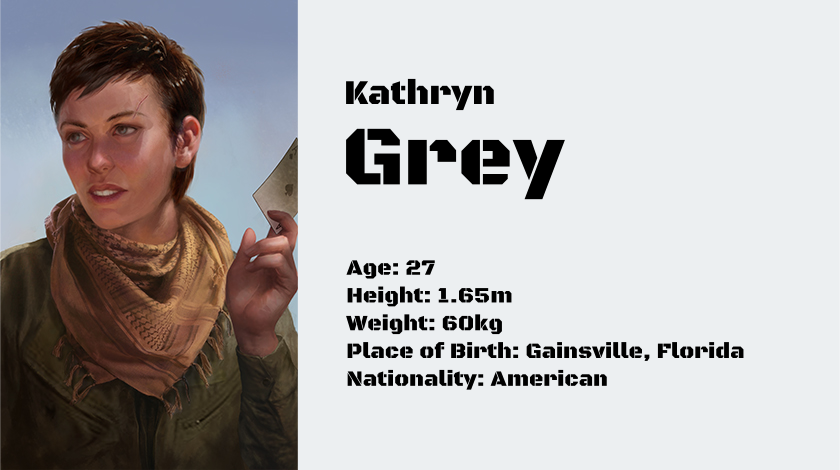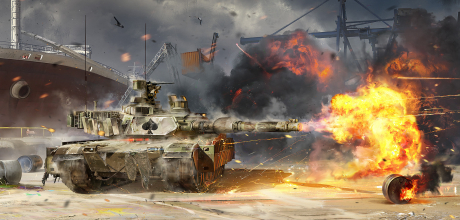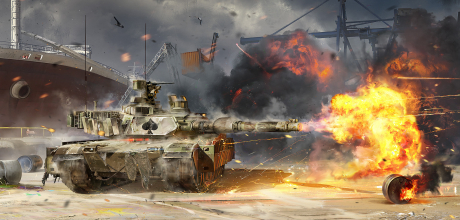
- Southern England, late autumn, 2040
Strom finally thought he understood why Seagrove had been chosen, but what about the second person in command – Kathryn Grey? The more he thought about it, the more confused he was. She was never a model corporate citizen; capable, but also headstrong and prone to rash decisions. Before he had the chance to ask, Clayburn brought the topic up by himself.
“As for Major Grey – and yes, I do know her by name,” he paused, “let’s go for now with the fact that she had, in fact, previously been a very capable officer.”
Strom raised his eyebrows questioningly.
“There had to be more to it than that.”
Clayburn’s empty smile was his only answer.

Biography
Major Kathryn Grey was born, along with her twin sister Anna, in Gainsville, Florida on March 3, 2012, to a family of a car mechanic and a waitress. She had a happy childhood, was loved by both parents and was perhaps the last generation to witness the United States of America in their former glory.
The fate of her father’s livelihood closely reflected the descent of the most powerful nation in the world into a corporatocracy with the previously important notions such as the liberty and the pursuit of happiness becoming an empty shell making way for corporate interests.
As a little girl, Kathryn used to watch her father fix all kinds of cars, from massive diesel-driven pickup trucks to the old classics from the 1960s. These memories are perhaps the most cherished ones for her to this day – her father fixing a car in his small garage next to their white-painted wooden house, her mother bringing them fresh-made lemonade and little Kate (a name she was only called by her mother) playing with her sister outside. There always was the American flag flying over the garage, a reflection of her family’s sense of patriotism that she would share when she became older.
The decline of the United States could be well observed in the family car-fixing business. By 2020, the newly-elected President of the United States announced an ambitious and massively expensive green plan for the country, which included full electrification of the vehicle park in mere five years. This, along with the inclusion of more and more electronics in car design, drove many small car repair shops out of business as the cars rapidly became too complicated to fix. Laws, outlawing the old “gas guzzlers”, as the media called them, were rapidly enacted, leaving the old and over-strained electric grid bearing the brunt of what the critics named the “Green Crusade”.
The results of this initiative were catastrophic. Realizing that taking out the electric grid would effectively immobilize entire regions, terrorists made a habit of targeting power distribution facilities, causing untold damage and – indirectly – thousands of deaths by disabling even critical facilities such as hospitals.
The only entities that would profit from the situation were – once again – large corporations, importing cheap goods from abroad, including the electric cars, thanks to generous import conditions, low tariffs and tax exempts, implemented by the administration in exchange for generous campaign contributions. The announced car industry rejuvenation never came to pass and the lives of millions of people tied to the car industry, like Kathryn’s family, only got worse.
The weakness of the American administration, now almost fully controlled by corporate interests, was best observed in its reaction to this crisis. Instead of lifting the strict emission limits and allowing the fossil fuel-powered vehicles back on the road, the United States Department of Transportation only issued permits to operate these vehicles to a selected few “ecologically responsible” corporations. By 2025, road transportation became a monopoly for a select few companies.
Finding it harder and harder to scrape by, Kathryn’s father was forced to close up his business in 2028. Kathryn and her sister, helping with the family business since they were 14 years old, had a hard time finding part-time jobs in the increasingly impoverished neighborhood. The stress of barely keeping the household together also negatively influenced her parents’ marriage with her father resorting to drinking more and more.
Desperate to improve the family situation and influenced by her sense of patriotism, Kathryn enlisted in the United States Army immediately after graduating from the Buchholz High School in 2030. Her decision was met with some understanding from her father, who still remembered the old U.S. Army as a force to be proud of and reckoned with, despite the corporate-controlled media campaign depicting it as a waste of money that could be spent better on tackling various environmental issues.
By 2030, however, the U.S. Army was a shadow of its former glory. Underfunded and using decades-old equipment, it was on a verge of near-collapse when Kathryn Grey enlisted. After a short training that showed her aptitude for machinery and landed her as a driver in a tank battalion, she was shipped to the El Arish base in northern Africa and then to Poland to serve, guarding the European borders against potential Russian incursions.
All the while, she kept in touch with her parents and sister as much as she could, sending them a large portion of her salary. It was not to last. In 2031, after the Great Internet Collapse, her calls home became sporadic as all the communications traffic had to be routed through dedicated military channels and the opportunities to call home became rare. By 2032, it all came crashing down.
In 2032, the Congress passed a military budget cut bill that sounded the death knell of the American forces abroad. Within several months, all the American military bases worldwide were closed and their soldiers ordered to return home – or honorably discharged and the equipment either purchased by European corporations or just left to rust, moving it back stateside deemed too expensive.
Kathryn’s situation once again became desperate – she knew that while she was a skilled mechanic and tank driver, the American job market would be flooded by tens of thousands of jobless veterans and her family still needed her support. The day she was discharged along with her entire platoon, a Clayburn Industries recruiter came to present a deal – the former American soldiers would be given the opportunity to work for Clayburn Industries as security personnel (in reality soldiers in all but name). They wouldn’t even need to learn to work with new equipment to a large extent – Clayburn was buying the entire unit stock wholesale.
The idea had sounded repulsive to Kathryn at first, but faced with a prospect of looking for a job in the United States, she realized that she would end up working for a corporation one way or another, regardless of where and this way she’d get to do what she liked with the people she liked. She never truly bonded with her unit with the thought of service being forced by her family’s economic situation always on her mind, but she worked well with her team and imagined she’d do so regardless of whose name was on the paycheck.
This hope, however, turned into disappointment as her unit was split and sent to different Clayburn security units the moment she arrived at Dover where the initial assignment center was located. The first day of Clayburn service, in the crowded social center, she tried to use the public phone to call home but the number was disconnected. For the first time, Kathryn felt truly alone in a foreign corporate world with the last several days shaking her to her very core.
The following days were even tougher as she tried to reach her parents over and over again but failed every time. Over the following months, however, she slowly adapted to her new life that in the end was not that different from the life in the army. The day she received her first paycheck, she sent the money across the ocean, as usual, realizing there were thousands of people like her working for Clayburn Industries and Clayburn’s private banking service was prepared for such an eventuality.
All further attempts to find out about her family had failed. The telephone was disconnected and they had no way of knowing where she was. Clayburn Industries had no branches in the United States but she was hoping they would contact her somehow – perhaps through the British embassy. With the internet connection between the United States and Europe severed and the barrier between the corporate world and the outside one, something that would have been a matter of seconds in the old world became a much more difficult task. The call from home she was hoping for never came.
Kathryn Grey eventually realized that she was on her own. She continued to send money home, but she mostly buried herself in work, training hard and running battle simulations over and over. She quickly rose through the ranks over the following years and became a capable commander, but her deep-rooted anger at the world, the loneliness and the attitude she sometimes displayed towards everything corporate never made her truly popular amongst the men and women of Clayburn Industries. It therefore came to her as a surprise when she was promoted to the rank of Major and put in command of a portion of Clayburn troops of Task Force Seahawk.
Character Traits
Kathryn Grey grew up as a happy, friendly and trusting person but the years of recession, the military service and especially her joining Clayburn Industries turned her into a wary, mistrustful woman. She becomes aggressive when threatened and is famously bad when it comes to hiding her feelings – her poor bluffing skills and subsequent disastrous attempts at playing poker earned her the nickname she sincerely hates – “Aces”. Under this layer, however, she’s deeply caring and has a strong sense of right or wrong. Some values are sacred to her – like the lives of her family and those she truly cares about – and she will go to any lengths to protect them, even to the point of overriding her moral compass.
Beliefs
Kathryn Grey hates the thought of corporatocracy and originally blamed corporations and the vague notion of “corruption” for everything bad that has befallen her home and family. These edges were blunted to a degree since she had started working for Clayburn Industries and had seen the support the corporation gives to its employees. She hates corporate propaganda, often driving her into conflicts with people who grew up in the corporate world, but she no longer considered Clayburn Industries to be evil incarnate until the order to slaughter civilians, which sparked her rage anew.
Combat Tactics
- Aggressive (prefers to take the fight to the enemy)
- Adaptive Tactics (she prefers mobility and flanking maneuvers over any sort of defense)
- Scout (whenever possible, prefers careful reconnaissance to going in blind)
- Stubborn (she never gives up even when against overwhelming forces)
Kathryn Grey will return in the Storyline Campaign Episode 2, launching in the near future!








